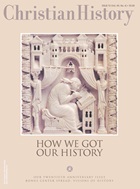In the development of the discipline of church history in the United States, few scholars played a more important role than the Swiss-born, German-educated immigrant Philip Schaff.
Known best for his multi-volume History of the Christian Church, which is still in print, Schaff spent his career arguing for and demonstrating the importance of studying the Christian past. Along the way, he founded the discipline of American church history.
Born in Chur, Switzerland, on New Year's Day in 1819, Schaff had a difficult childhood. He experienced poverty and life in an orphanage, where he was sent after his father died and his mother remarried. Fortunately, a series of benefactors cared for him and provided warm Christian nurture that would shape the rest of his life.
As a student at the boys' academy in Kornthal, Schaff experienced a dramatic spiritual rebirth that delivered him from intense anguish of soul and allowed him, as he wrote in Personal Reminiscences, "to realize for the first time what it is to have peace with God through the atoning blood of Christ which washes away all sin." This experience would characterize Schaff's piety throughout the rest of his life and would also influence his understanding of the role of the church historian.
Schaff studied at the University of Tübingen, one of the most dynamic institutions for theological study in the world at that time, and at Halle before moving on to the University of Berlin, where he found an intellectual home in the mediating theology of August Neander. Schaff called Neander "the most important church historian of our time" and "the father of modern church history."
Schaff also appreciated his mentor's deep faith and the Christian devotion that pervaded his work. Schaff noted that "the most enduring merit of Neander's church history consists in the vital union of the two elements of science and Christian piety."
Early in his teaching career, Schaff received an invitation that would change his life and the future of the discipline of church history. Two delegates appeared from tiny Mercersburg Seminary, in the isolated hills of south central Pennsylvania, and offered Schaff a position there, on the recommendation of his professors. The young scholar wrestled with the opportunity and eventually came to see it as a "Macedonian call, 'Come over and help us!'" to which he had to respond.
He arrived in Mercersburg in August 1844 and was pleasantly surprised at his compatibility with his only colleague at the seminary, John Williamson Nevin. Together, historian Schaff and theologian Nevin
developed a system known as "Mercersburg Theology," which emphasized the church's heritage and traditions in the face of the prevalent American anti-historical sense. The two men established Mercersburg as an unexpected center of American theological scholarship.
By 1863, Schaff believed that his work at Mercersburg was completed. He spent five years as secretary of the New York Sabbath Committee, then accepted a position at Union Theological Seminary as "Professor of Theological Encyclopedia and Christian Symbolism." That title reflects the astounding breadth of Schaff's scholarship and teaching.
During his time at Union, Schaff became involved in numerous ecumenical and scholarly projects, including organizing the international meeting of the Evangelical Alliance in New York in 1873, serving as president of the American Committee of Revisers of the Authorized Version of the Bible through the project's completion in 1885, founding the American Society of Church History in 1888, and writing and editing a number of multi-volume works of biblical scholarship and church history.
Where opposites unite
Schaff was guided by a number of principles in his study of history. He was convinced, for example, that church history courses in the few seminaries that even offered them conformed to a "dry, lifeless style" that failed to probe the "main thing in history, the ideas which rule it and reveal themselves in the process." Most church history education likewise failed to foster a sense organic development, leaving students unable to understand their own or their movement's place in the overall history of the church.
Following philosopher G.W.F. Hegel, who posited that cycles of thesis, antithesis, and synthesis raise what is preserved to a higher level, Schaff maintained that "spiritual growth is likewise a process of annihilation, preservation, and exaltation." An example of this process in Christian thought and practice was the emergence of the Protestant Reformation out of the medieval Catholic Church.
"The practical piety and morality of Roman Catholicism," said Schaff, "is characteristically legal, punctilious, unfree and anxious; but distinguished also for great sacrifices, the virtue of obedience, and full consecration to the Church." The Protestant Reformation brought a needed corrective through a faith that "is evangelically free, cheerful and joyous in the possession of justification by grace."
The abuses of medieval Catholicism were abolished, and the best of the catholic heritage of the Church was maintained, while the Protestant principle of renewal and reform brought about a higher and fuller form of Christianity. In turn, the weaknesses of Protestantism, in particular its tendency to fragment the unity of the Church—especially notable in the American context—would be corrected through the emergence of "evangelical-catholic" Christianity in the future.
For Schaff, though, it is important to note that development never moved beyond the essential character of Christianity that was present at its beginning. The acorn becomes an oak, but never an apple tree.
A project that Schaff envisioned, but did not live to see to completion, was a series of American denominational histories to be produced under the auspices of the American Society of Church History.
The authors of the volumes were to be ecumenically minded, first-rate scholars whose work would portray their own denominations objectively while also recognizing the virtues of other groups. The studies were to be "decidedly irenical in spirit," and Schaff hoped that the volumes would help Christians understand and appreciate both their distinctive contributions to the Christian tradition and their common heritage.
Schaff viewed the project and its resulting volumes as "a means of bringing the different churches into closer union and ultimate cooperation." This vision clearly illustrates Schaff's sense that the study of history serves the life and future of the church.
Some of Schaff's assumptions about the study and writing of the history of Christianity have been superceded. His model of careful, accurate, comprehensive, and irenic scholarship, though, remains worthy of admiration and emulation.
Stephen R. Graham is dean of faculty and academic life, as well as professor of American church history, at North Park Theological Seminary in Chicago.
Copyright © 2001 by the author or Christianity Today/Christian History magazine.
Click here for reprint information on Christian History.

Support Our Work
Subscribe to CT for less than $4.25/month




























